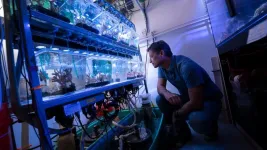(Press-News.org) Women produce physiological data that is just as predictable as men, at least when it comes to skin temperature. This might seem like common sense, but variations in body signals due to menstrual cycles, such as temperature, were used as an excuse to keep women out of clinical studies for decades.
The data for the finding was gathered from a wearable device to continuously monitor the skin temperature of 600 people, half female and half male, over six months.
The team found that there were more differences between any two individuals in the study, whether male or female, than between the sexes. The researchers found that skin temperature mostly varied as a function of time of day and whether the subject was awake or asleep, across male and female participants.
Many women do not have large menstrual cycles, and neither cycles nor sex accounted for significant differences in variability of any group. It’s the first time that a study has continuously tracked human skin temperature over such a long period of time, to the best of the researchers’ knowledge. The team published their findings in the Nov. 1, 2023 issue of the journal Biology of Sex Differences.
Despite guidelines from the National Institutes of Health that require studies to include females and minorities in clinical studies, women are still disproportionately excluded from research, particularly in drug trials. This is due in part to concerns that menstrual cycles would introduce too many variables in the data.
And despite the harm to women that results from using medicines designed for men, including higher overdose and side effect rates, no one had yet looked at continuous physiology signals across large groups of men and women to see if women’s cycles really did make the data harder to analyze–until now. The study didn’t find any statistically significant differences, showing that concern is not warranted.
The team included researchers from the San Diego Supercomputer Center, the Halicioglu Data Science Institute and the Jacobs School of Engineering at the University of California San Diego as well as the UC San Francisco Osher Center for Integrative Health.
The UC San Diego team has been working with the UC San Francisco team, led by co-senior author Dr. Ashley E. Mason, since 2020 to gather wearable data from around the world and develop tools for detecting disease outbreaks. “If the point is that we can now use wearables to track health over big groups of people, then it makes no sense to exclude whole groups of people from the research” said Mason, a sleep clinician and principal investigator of the broader TemPredict project from which this study grew.
The team chose to track skin temperature because it’s essentially a way to monitor the state of a person’s endocrine system, said Ben Smarr, the paper’s corresponding author and a professor in the Shu Chien Gene Lay Department of Bioengineering and the Halicioglu Data Science Institute at the University of California San Diego. Temperature has been tied to hormonal changes, daily rhythms and women’s health states by previous research.
“In this study, the difference between two men is bigger than the difference between the average man and the average woman,” said Lauryn Keeler Bruce, the paper’s first author and a Ph.D. student in the Biomedical Informatics and Systems Biology program at UC San Diego. “In addition, the variability between men and women is not statistically significant.”
Smarr and colleagues used the ŌURA ring, a smart wearable produced by Finland-based company Oura Ring to track skin temperature in the study. The device can also track heart rate, activity, and provides sleep tracking. The ŌURA Ring has become a go-to research tool because it’s easy to use and delivers high-quality data. It has been used in recent publications about medical device adherence, predicting pregnancy outcomes, and tracking COVID-19.
Through statistical analysis the team developed, they found, in women who cycled, a pattern of variation in nightly maximum skin temperature over a roughly 28-day period, consistent with menstrual cycles. This was not unexpected, as temperature monitoring has been used as a tool to track fertility across many cultures. If anything, the pattern made variations easier to predict for the subjects that experienced it. The data for these females was more predictable than for all the other subjects in the study.
“This analysis confirms that ovarian rhythms do affect temperature,” the researchers write. “This analysis does not suggest that these rhythms make any given measurement more prone to error.”
Researchers also pointed out that none of their female subjects constantly had a 28-day cycle. “No one was a textbook example,” Keeler Bruce said.
Researchers hope that other teams will adopt their methodology. Being able to continuously monitor physiological signals, such as temperature, is crucial in capturing a more accurate picture of a person’s health, Smarr said. “In order to know what disturbs a pattern, you need to know what the pattern is in the first place,” he said.
The team plans to examine data from pregnant people throughout pregnancy next. They also plan to examine the differences in activity patterns between male and female subjects.
Variability of temperature measurements recorded by a wearable device by biological sex
https://doi.org/10.1186/s13293-023-00558-z
UC San Diego
Department of Biomedical Informatics: Lauryn Keeler Bruce
Shu Chien-Gene Lay Department of Bioengineering: Patrick Kasl and Benjamin L. Smarr
Bioinformatics and Systems Biology: Severine Soltani
Department of Electrical and Computer Engineering: Varun K. Viswanath
Halicioglu Data Science Institute: Iklay Altintas, Amaranath Gupta and Benjamin L. Smarr
San Diego Supercomputer Center: Saubhasis Dasgupta, Iklay Altintas and Amaranath Gupta
UC San Francisco Osher Center for Integrative Health: Wendy Hartogensis, Frederick M. Hecht, Anoushka Chowdhary, Claudine Anglo, Keena Pandya and Ashley Mason
City University New York, Baruch College: Stephan Dilchert
END
Women produce skin temperature data that are just as predictable as men
The finding shows that women should not be excluded from clinical studies because of variations in physiological signals due to menstrual cycles
2023-11-09
ELSE PRESS RELEASES FROM THIS DATE:
Vanderbilt and Duke awarded Moore Foundation grant to improve oversight of AI technology in health care systems
2023-11-09
Vanderbilt University Medical Center (VUMC) and Duke University School of Medicine have been awarded a $1.25 million grant from the Gordon and Betty Moore Foundation for the project “Measuring Artificial Intelligence (AI) Maturity in Healthcare Organizations.”
Working with the Coalition for Health AI (CHAI) and the University of Iowa, a team of experts will leverage the grant to develop a maturity model framework. The project leads are Peter Embí, MD, MS, and Laurie Novak, ...
Doctoral degrees without borders
2023-11-09
Doctoral students at nine New York City area graduate engineering programs will soon be able to take courses at each other’s institutions without any additional tuition, as part of a new multi-school agreement announced today.
The Inter-University Engineering Doctoral Consortium (IUEDC), led by NYU Tandon School of Engineering, encourages Ph.D. students to complement their primary program by taking courses of interest offered at different schools, providing access to specialty instruction and expertise that may not be available at their home universities. Students should be ...
Scientists find 14 new transient objects in space by peering through the 'Christmas Tree Galaxy Cluster'
2023-11-09
An international team of scientists, led by University of Missouri’s Haojing Yan, used NASA’s James Webb Space Telescope (JWST) to discover 14 new transient objects during their time-lapse study of galaxy cluster MACS0416 — located about 4.3 billion light years from Earth — which they’ve dubbed as the “Christmas Tree Galaxy Cluster.”
“Transients are objects in space, like individual stars, that appear to suddenly brighten by orders of magnitudes and then fade away,” said Yan, an associate professor in the Department ...
2023 AAAS Kavli Science Journalism Award winners named
2023-11-09
Stories about troubling aspects of science’s past as well as some hopeful signs for its future are among the winners of the 2023 AAAS Kavli Science Journalism Awards.
Presenter Adam Rutherford and producer Ilan Goodman won a Gold Award in the Audio category for a BBC series on the eugenics movement and its continuing repercussions in the modern age. Ashley Smart of Undark magazine won the Gold Award in the Science Reporting In-Depth category for a piece on the lingering impact of scientific racism, including the appropriation of legitimate genetics research for extremist ends.
On a more ...
Regenstrief experts will address national, global challenges at AMIA symposium
2023-11-09
INDIANAPOLIS -- Regenstrief Institute informaticians and other data experts will share their research insights and innovations from November 11-15 at the 2023 American Medical Informatics Association (AMIA) Annual Symposium in New Orleans, Louisiana.
Two Regenstrief researchers also were part of the leadership team that organized and helped set the agenda for the conference, “Transforming Healthcare and Biomedicine for a Sustainable Future.”
AMIA’s Annual Symposium is the premier medical informatics event, presenting leading-edge scientific research and a wide array of scientific sessions. The symposium presents work from across the spectrum of the informatics ...
Early life exposure to broccoli sprouts protects against colitis in inflammatory bowel disease
2023-11-09
Washington, D.C.—High fiber diets, like those that include broccoli sprouts or other cruciferous vegetables, may reduce disease symptoms and improve quality of life in patients with inflammatory bowel disease (IBD), according to a study conducted in mice. The study was published in mSystems, a journal of the American Society for Microbiology.
In the study, the investigators used a popular interleukin-10-knockout (IL-10-KO) mouse model of Crohn’s to investigate the interactions between mice and their immune systems, as well as the broccoli ...
The Paul G. Allen Frontiers Group announces Allen Discovery Center for Neuroimmune Interactions at Icahn School of Medicine at Mount Sinai
2023-11-09
SEATTLE, W.A.—November 9, 2023—The Paul G. Allen Frontiers Group, a division of the Allen Institute, today announced the launch of the Allen Discovery Center (ADC) for Neuroimmune Interactions at the Icahn School of Medicine at Mount Sinai. The research team will comprehensively define and map the interactions between the nervous system and the immune system that take place distant from the brain, such as at the skin, lung, and gut surfaces, and analyze how these interactions relay a variety of sensations back to the brain and regulate organ physiology and tissue immune responses.
"Understanding ...
Lei Shi elected as a member of the STM Board
2023-11-09
On 16 October 2023, the newly elected STM Board Members were announced at the Annual General Meeting. Lei Shi, the Deputy Editor-in-Chief of Tsinghua University Press (TUP), and the Director of both the Journal Publishing Center and Academic Publishing Center of TUP has been elected to the designated seat representing non-Europe/US based companies. He became the first Chinese representative on the STM Board.
STM is the world’s leading association of scholarly publishers, who is committed to advance trusted research for ...
UTSA MATRIX AI Consortium receives $2 million to make AI more efficient
2023-11-09
The National Science Foundation (NSF) has awarded a $2 million grant through its Emerging Frontiers in Research Initiatives (EFRI) program to investigators at the UTSA MATRIX AI Consortium for Human Well-Being for research that will help bridge the gap between human brain processing efficiency and the limitations of current artificial intelligence (AI) models.
This endeavor seeks to create a new form of AI that rapidly learns, adapts to and operates in uncertain conditions, all while effectively addressing ...
Incheon National University researchers push the limits of gas sensing technology
2023-11-09
The world has become increasingly industrialized over the past few centuries, bringing all sorts of technology and conveniences to the masses. However, workers in industrial environments are often at the risk of exposure to many dangerous gases, such as nitrogen dioxide (NO2). Inhaling this gas can lead to serious respiratory diseases like asthma and bronchitis, and severely compromise the health of industrial workers. Constant monitoring of NO2 levels is thus needed to ensure a safe workplace.
To help with this, many types of selective gas sensors have been developed using different ...
LAST 30 PRESS RELEASES:
COVID-19 vaccination during pregnancy may help prevent preeclampsia
Menopausal hormone therapy not linked to increased risk of death
Chronic shortage of family doctors in England, reveals BMJ analysis
Booster jabs reduce the risks of COVID-19 deaths, study finds
Screening increases survival rate for stage IV breast cancer by 60%
ACC announces inaugural fellow for the Thad and Gerry Waites Rural Cardiovascular Research Fellowship
University of Oklahoma researchers develop durable hybrid materials for faster radiation detection
Medicaid disenrollment spikes at age 19, study finds
Turning agricultural waste into advanced materials: Review highlights how torrefaction could power a sustainable carbon future
New study warns emerging pollutants in livestock and aquaculture waste may threaten ecosystems and public health
Integrated rice–aquatic farming systems may hold the key to smarter nitrogen use and lower agricultural emissions
Hope for global banana farming in genetic discovery
Mirror image pheromones help beetles swipe right
Prenatal lead exposure related to worse cognitive function in adults
Research alert: Understanding substance use across the full spectrum of sexual identity
Pekingese, Shih Tzu and Staffordshire Bull Terrier among twelve dog breeds at risk of serious breathing condition
Selected dog breeds with most breathing trouble identified in new study
Interplay of class and gender may influence social judgments differently between cultures
Pollen counts can be predicted by machine learning models using meteorological data with more than 80% accuracy even a week ahead, for both grass and birch tree pollen, which could be key in effective
Rewriting our understanding of early hominin dispersal to Eurasia
Rising simultaneous wildfire risk compromises international firefighting efforts
Honey bee "dance floors" can be accurately located with a new method, mapping where in the hive forager bees perform waggle dances to signal the location of pollen and nectar for their nestmates
Exercise and nutritional drinks can reduce the need for care in dementia
Michelson Medical Research Foundation awards $750,000 to rising immunology leaders
SfN announces Early Career Policy Ambassadors Class of 2026
Spiritual practices strongly associated with reduced risk for hazardous alcohol and drug use
Novel vaccine protects against C. diff disease and recurrence
An “electrical” circadian clock balances growth between shoots and roots
Largest study of rare skin cancer in Mexican patients shows its more complex than previously thought
Colonists dredged away Sydney’s natural oyster reefs. Now science knows how best to restore them.
[Press-News.org] Women produce skin temperature data that are just as predictable as menThe finding shows that women should not be excluded from clinical studies because of variations in physiological signals due to menstrual cycles





